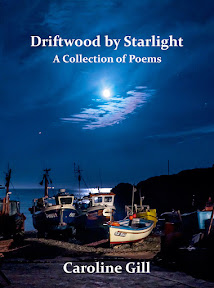 |
| Jaywick Martello Tower |
This Martello tower...
solid, strong and undefeated
from 'The Rifleman's Ghost' by Judith Wolton
I attended the April gathering of the Ipswich Poetry Cafe last night. Essex poet, Judith Wolton, and photographer, Alan Hockett, treated us to a presentation of poetry and pinhole-photography from the Essex coast. I am always fascinated by the extra spark of creativity that is invariably produced when two dedicated practitioners collaborate on a project.
The shared work had resulted in a book, Words from the edge and other Drosscapes (Estuarine Press, 2016), in which Judith's evocative poems complement Alan's striking pinhole photographs.
Judith's poems, springboarded into being by Alan's images, feature mythology, topography, local culture, birds, barges, batteries and narratives of the imagination. I love the way in which old buildings like the Playdrome have been given personalities. In 'This old show girl' we find the 'old dame' of a building with...
her lipstick smudged,
her wrinkles showing.
It was fascinating to learn a little about Alan's practice as a pinhole photographer. Some of the swirling effects were achieved by shaking the chemicals during the development stage. Apparently the photograph failure rate is quite high, but for every few failures, an experienced pinhole photographer like Alan can achieve a couple of stunning and unique images. I came away still not quite sure whether his recycling bin was actually as full of old bean cans as he would have us believe! If you click this link you will see how to make a camera from a Coke can. There are secrets that can be (and indeed were) shared, but it is surely a good thing in art when the viewer feels that some dots have been left unjoined. The photographs themselves have a misty, ethereal quality about them, somewhat reminiscent of the paintings of John Atkinson Grimshaw or perhaps works in Whistler's series of Nocturnes.
I was struck by how different, how very different, the chosen places were to the leafy inland areas of Suffolk and Essex that comprise Constable Country, especially when you realise that Manningtree (which features in the book) and Flatford are near neighbours on the map. Essex has a wild and windswept coastline, haunted by pirates (and at this point Baring-Gould's Gothic novel, Mehalah, comes to mind), ghost boats and rusting bolts of iron.
Appearances can be deceptive to the traveller, but those with local knowledge and an artist's eye are less easily fooled into believing that the drosscapes presented in the volume have had their day. Piers and cranes may have become bare skeletons, but the tide is constantly re-shaping, recreating, the coastline – a process mirrored in the work of Judith and Alan. These artists have given a sense of new life to some of the forgotten stretches of shore along the county's zigzagging sweep of 350 miles.
 |
| Essex Coast |











